- Average Rating:
- Not yet rated
- Topic Areas:
- Workshops | Love | Couples Therapy | Neurobiology
- Categories:
- Couples Conference | Couples Conference 2012
- Faculty:
- Helen E. Fisher, PhD
- Course Levels:
- Master Degree or Higher in Health-Related Field
- Duration:
- 1:35:03
- Format:
- Audio and Video
- Original Program Date:
- Apr 29, 2012
- Short Description:
- In her lecture, Fisher discusses four biologically based styles of thinking and behaving and, using her data on mate choice among 28,000 individuals, shows why we are chemically drawn to one person rather than another. In this workshop Fisher goes deeper into these natural temperament constellations, and discusses how partners with very different (and similar) biological styles of thinking and behaving interact to create great joy, confusion and sorrow in their partnerships.
- Price:
-
Sale is $29.00
price reduced from Base Price - $59.00
Tags: Love Couples Therapy Neurobiology

- Average Rating:
- Not yet rated
- Topic Areas:
- Workshops | Anger | Couples Therapy | Neurobiology
- Categories:
- Couples Conference | Couples Conference 2012
- Faculty:
- Rick Hanson, PhD
- Duration:
- 1:55:29
- Format:
- Audio Only
- Original Program Date:
- Apr 29, 2012
- Short Description:
- The first emotion our ancestors evolved was fear—and we remain highly threat reactive today, continually overestimating threats and underestimating opportunities and resources. We’ll explore multiple methods for helping clients “cool the fires” of fear and anger, and internalize inner strength and an appropriate sense of safety.
- Price:
- $15.00 - Base Price
Tags: Anger Couples Therapy Neurobiology
- Average Rating:
- Not yet rated
- Topic Areas:
- Keynotes | Couples Therapy | Neurobiology
- Categories:
- Couples Conference | Couples Conference 2016
- Faculty:
- Daniel Siegel, MD
- Course Levels:
- Master Degree or Higher in Health-Related Field
- Duration:
- 1:03:24
- Format:
- Audio and Video
- Original Program Date:
- May 13, 2016
- Short Description:
- The interdisciplinary field of Interpersonal Neurobiology combines all disciplines of science and other fields into one framework and offers a definition of the mind and of mental health that are of practical benefit to those seeking to enhance resilience and well-being. This perspective proposes that one aspect of the mind is an "emergent, self-organizing, embodied and relational process that regulates the flow of energy and information." From this view, a healthy mind and health itself emerge from a process called integration–the linkage of differentiated parts.
- Price:
-
Sale is $29.00
price reduced from Base Price - $59.00
Tags: Couples Therapy Neurobiology
Credit available - Click Here for more information
- Average Rating:
- Not yet rated
- Topic Areas:
- Addiction | Couples Therapy | Workshops | Continuing Education | Love | Neurobiology | Neuroscience
- Categories:
- Couples Conference | Couples Conference 2018 | Online Continuing Education
- Faculty:
- Helen E. Fisher, PhD
- Course Levels:
- Master Degree or Higher in Health-Related Field
- Duration:
- 1:57:48
- Format:
- Audio and Video
- Original Program Date:
- May 04, 2018
- Short Description:
- Biological Anthropologist Helen Fisher discusses four broad basic styles of thinking and behaving associated with four primary brain systems: the dopamine, serotonin, and testosterone and estrogen/oxytocin systems. She discusses why people are predisposed to love one person rather than another (mate choice). She hypothesizes that individuals who primarily express of the constellation of traits linked with each of these brain systems may be predisposed to different forms of love addiction, includ
- Price:
-
Sale is $29.00
price reduced from Base Price - $59.00
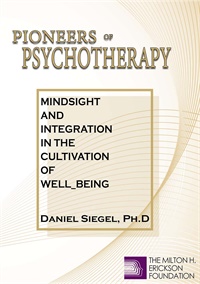
- Average Rating:
- Not yet rated
- Topic Areas:
- Clinical Demonstrations | Psychotherapy | Relationships | Mindfulness | Neurobiology
- Bundle(s):
- Pioneers of Psychotherapy Bundle
- Categories:
- Pioneers of Psychotherapy | Evolution of Psychotherapy | Evolution of Psychotherapy 2009
- Faculty:
- Daniel Siegel, MD
- Course Levels:
- Master Degree or Higher in Health-Related Field
- Duration:
- 00:56:00
- Format:
- Audio and Video
- Original Program Date:
- Dec 10, 2009
- Short Description:
- Daniel Siegel (2009) Mindsight and Integration in the Cultivation of Well-Being demonstrates interpersonal neurobiology therapy with a volunteer studying to be a therapist. She has experienced fear in one clinical setting and has also been “the glue,” holding together her family since she was young. Siegel uses the triangle of relationship/ mind/brain to help the volunteer experience her fear of responsibility by allowing images and body sensations to flow to “soften the mind.”
- Price:
- $59.00 - Base Price

- Average Rating:
- Not yet rated
- Topic Areas:
- Ericksonian Psychotherapy | Psychotherapy | Invited Addresses | Neurobiology | Neuroscience
- Categories:
- Evolution of Psychotherapy | Evolution of Psychotherapy 2000
- Faculty:
- Ernest Rossi, PhD | Thomas Szasz, MD
- Duration:
- 1 Hour 25 Minutes
- Format:
- Audio Only
- Original Program Date:
- May 28, 2000
- Short Description:
- Current research on neurogenesis (growth of new brain cells) indicates that novelty, environmental enrichment and physical exercise can facilitate new growth in the adult human brain. How can we optimize our Ericksonian approaches to support the psychobiological growth process?
- Price:
- $15.00 - Base Price
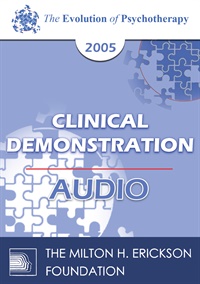
- Average Rating:
- Not yet rated
- Topic Areas:
- Clinical Demonstrations | Neurobiology | Psychotherapy | Neuroscience
- Categories:
- Evolution of Psychotherapy | Evolution of Psychotherapy 2005
- Faculty:
- Daniel Siegel, MD
- Duration:
- 1 Hour 1 Minutes
- Format:
- Audio Only
- Original Program Date:
- Dec 10, 2005
- Short Description:
- Educational Objectives: To name four basic principles of interpersonal neurobiology in relation to the process of psychotherapy. To describe the ways in which the therapeutic relationship shapes brain function in the present, helps loosen old neural maps, and "snags" the brain in order to promote neural activation and growth in very targeted ways.
- Price:
- $15.00 - Base Price
- Average Rating:
- Not yet rated
- Topic Areas:
- Dialogues | Neurobiology | Neuroscience | Psychotherapy
- Categories:
- Evolution of Psychotherapy | Evolution of Psychotherapy 2005
- Faculty:
- Ernest Rossi, PhD | Daniel Siegel, MD
- Course Levels:
- Master Degree or Higher in Health-Related Field
- Duration:
- 59:36
- Format:
- Audio and Video
- Original Program Date:
- Dec 10, 2005
- Short Description:
- Dialogue 10 from the Evolution of Psychotherapy 2005 - The Psychobiology of Change Featuring Ernest Rossi, PHD, and Daniel Siegel, MD
- Price:
-
Sale is $29.00
price reduced from Base Price - $59.00

- Average Rating:
- Not yet rated
- Topic Areas:
- Point/Counterpoint Sessions | Neurobiology | Object Relations Theory | Psychotherapy | Attachment | History of Psychotherapy
- Categories:
- Evolution of Psychotherapy | Evolution of Psychotherapy 2005
- Faculty:
- James F. Masterson, MD | Erving Polster, PhD
- Duration:
- 1 Hour 18 Minutes
- Format:
- Audio Only
- Original Program Date:
- Dec 10, 2005
- Short Description:
- This talk first briefly reviews the history of the Developmental, Self and Object Relations theoretical approach to the personality disorders as a preface to exploring the latest additions to the theory, i.e., Attachment Theory and Neurobiological Development of the Self in the Right Brain. Attachment Theory: The work of Ainsworth and others is described leading to the attachment categories in the infant and the adult. Many follow-up studies are presented validating the persistence of the categories over time. Neurobiologic Development of the Self in the Right Brain: The work of Alan Schore, Ph.D. is used to describe the development of the self in the right prefrontal cortex of the brain. Integration: The integration of the two theories with the object relations approach are described and illustrated through therapeutic alliance
- Price:
- $15.00 - Base Price
- Average Rating:
- Not yet rated
- Topic Areas:
- State of the Art Address | Neurobiology | Psychotherapy
- Categories:
- Evolution of Psychotherapy | Evolution of Psychotherapy 2005
- Faculty:
- Daniel Siegel, MD
- Course Levels:
- Master Degree or Higher in Health-Related Field
- Duration:
- 1:02:46
- Format:
- Audio and Video
- Original Program Date:
- Dec 11, 2005
- Short Description:
- Interpersonal neurobiology is a way to define mental health and the kinds of social experiences the brain requires to achieve a coherent mind. This interdisciplinary synthesis of science reveals an exciting convergence among research findings that helps us in mental health to explore the interplay among relationships, the mind and the brain. Experience shapes the connections in the brain in ways that we can now understand and harness within psychotherapy to help stimulate the neuronal activation and growth necessary to achieve resilience and emotional well-being.
- Price:
-
Sale is $29.00
price reduced from Base Price - $59.00
Tags: Neurobiology Psychotherapy
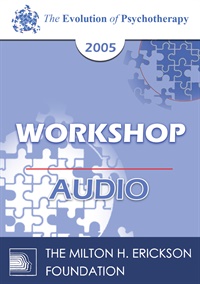
- Average Rating:
- Not yet rated
- Topic Areas:
- Workshops | Children and Adolescent Therapy | Neurobiology | Neuroscience | Psychotherapy
- Categories:
- Evolution of Psychotherapy | Evolution of Psychotherapy 2005
- Faculty:
- Daniel Siegel, MD
- Duration:
- 2 Hours 37 Minutes
- Format:
- Audio Only
- Original Program Date:
- Dec 08, 2005
- Short Description:
- An interpersonal neurobiology approach to parenting helps psychotherapists promote secure attachment within families by nurturing the creation of coherent narratives of parents' early life experiences. This scientific view proposes that empathetic relationships making sense within our life stories, harmonious mental functioning and an integrated brain all mutually reinforce each other.
- Price:
- $15.00 - Base Price
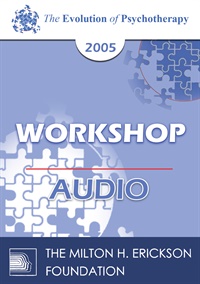
- Average Rating:
- Not yet rated
- Topic Areas:
- Workshops | Trauma | Eye Movement Desensitization and Reprocessing (EMDR) | Hypnosis | Memory | Neurobiology | Neuroscience | Psychotherapy
- Categories:
- Evolution of Psychotherapy | Evolution of Psychotherapy 2005
- Faculty:
- Bessel van der Kolk, MD
- Duration:
- 2 Hours 7 Minutes
- Format:
- Audio Only
- Original Program Date:
- Dec 10, 2005
- Short Description:
- Starting with a review of recent studies on the neurobiology of trauma, Dr. van der Kolk will examine the utility of approaches from the fields of hypnosis, body oriented therapies and EMDR, both with research data and videotaped clinical interventions. The integration of these approaches during different stages of treatment will be discussed.
- Price:
- $15.00 - Base Price
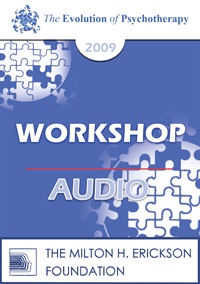
- Average Rating:
- Not yet rated
- Topic Areas:
- Workshops | Neurobiology | Psychotherapy | Relationships
- Categories:
- Evolution of Psychotherapy | Evolution of Psychotherapy 2009
- Faculty:
- Daniel Siegel, MD
- Duration:
- 2 Hours
- Format:
- Audio Only
- Original Program Date:
- Dec 13, 2009
- Short Description:
- This workshop will immerse us in an exploration of how the human brain, mind, and relationships form an interconnected“triangle of well-being” involving the flow of energy and information. The mind regulates this flow; our relationships share this flow; and the brain serves as a mechanism mediating this flow. Knowing how to work with empathic relationships, a coherent mind, and an integrated brain builds a perspective on how to approach psychotherapy from an “interpersonal neurobiology” perspective. Nine domains of integration will be highlighted for application in psychotherapy.
- Price:
- $15.00 - Base Price
Credit available - Click Here for more information
- Average Rating:
- Not yet rated
- Topic Areas:
- Great Debates | Post-Traumatic Stress Disorder (PTSD) | Trauma | Neurobiology | Psychotherapy
- Bundle(s):
- Learning Track - EP17 Trauma Stream
- Categories:
- Evolution of Psychotherapy | Evolution of Psychotherapy 2017 | Evolution of Psychotherapy Trauma Learning Track | Online Continuing Education
- Faculty:
- Donald Meichenbaum, PhD | Bessel van der Kolk, MD
- Course Levels:
- Master Degree or Higher in Health-Related Field
- Duration:
- 1:19:12
- Format:
- Audio and Video
- Original Program Date:
- Dec 14, 2017
- Short Description:
- In the aftermath of traumatic and victimizing experiences, most individuals are impacted, but 75% evidence resilience while 25% “get stuck” and develop PTSD and co-occurring disorders. This presentation will discuss what distinguishes these two groups and considers the implications for treatment.
- Price:
-
Sale is $29.00
price reduced from Base Price - $59.00
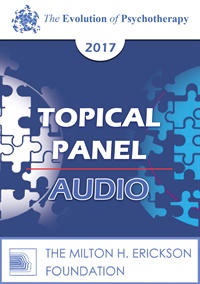
- Average Rating:
- Not yet rated
- Topic Areas:
- Topical Panels | Art and Creativity | Neurobiology | Psychotherapy | Communication
- Categories:
- Evolution of Psychotherapy | Evolution of Psychotherapy 2017
- Faculty:
- Jean Houston, PhD | Scott Miller, PhD | Daniel Siegel, MD
- Duration:
- 1:01:30
- Format:
- Audio Only
- Original Program Date:
- Dec 16, 2017
- Short Description:
- Psychotherapy is an amalgamation of science and art. All we’ve can be created that amalgamates the art of effective therapeutic communication and empirically validated orientations.
- Price:
- $15.00 - Base Price
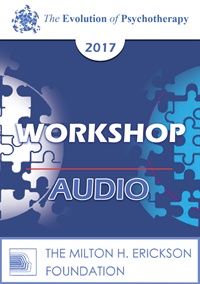
- Average Rating:
- Not yet rated
- Topic Areas:
- Workshops | Neuroscience | Neurobiology | Ericksonian Hypnosis and Therapy Techniques | Experiential Therapy
- Bundle(s):
- Learning Track - EP17 Erickson Download
- Categories:
- Evolution of Psychotherapy | Evolution of Psychotherapy 2017 | Evolution of Psychotherapy Erickson Learning Track
- Faculty:
- Ernest Rossi, PhD | Kathryn Rossi, PhD
- Duration:
- 2:48:35
- Format:
- Audio Only
- Original Program Date:
- Dec 17, 2017
- Short Description:
- In this experiential workshop, we will learn the theory and practice of methods evolved out of Milton H Erickson’s innovative approaches to therapeutic hypnosis as presented in our new book. These easy-to-learn methods can facilitate Erickson’s natural problem solving and MindBody Healing that can supplement CBT, mindfulness, meditation, movement, and yoga.
- Price:
- $15.00 - Base Price

- Average Rating:
- Not yet rated
- Topic Areas:
- Neurobiology | Neuroscience | Great Conversations | Trauma | Post-Traumatic Stress Disorder (PTSD)
- Categories:
- Evolution of Psychotherapy | Evolution of Psychotherapy 2020
- Faculty:
- Donald Meichenbaum, PhD
- Course Levels:
- Master Degree or Higher in Health-Related Field
- Duration:
- 2 hours 8 minutes
- Format:
- Audio and Video
- Original Program Date:
- Dec 11, 2020
- Short Description:
- In the aftermath of experiencing traumatic and victimizing experiences, most individuals are impacted, but some 75% go onto evidence resilience, and in some instances Post Traumatic Growth. If the “body keeps score”, then what distinguishes the 75% resilient group from the 25% who develop PTSD and related disorders? This debate will address this question and the treatment implications for psychotherapeutic interventions.
- Price:
-
Sale is $29.00
price reduced from Base Price - $59.00
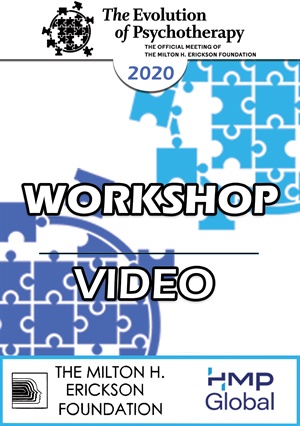
- Average Rating:
- Not yet rated
- Topic Areas:
- Neurobiology | Workshops | Consciousness | Psychotherapy
- Bundle(s):
- EP20 Highlights
- Categories:
- Evolution of Psychotherapy | Evolution of Psychotherapy 2020
- Faculty:
- Daniel Siegel, MD
- Course Levels:
- Master Degree or Higher in Health-Related Field
- Duration:
- 2 hours
- Format:
- Audio and Video
- Original Program Date:
- Dec 10, 2020
- Short Description:
- This workshop will explore the findings from a 10,000-person survey of a mind-training practice, the Wheel of Awareness, and how they can inform an understanding of the mind, mental health, and the transformative power of harnessing consciousness in psychotherapy. Workshop participants are encouraged to practice the Wheel of Awareness before the event so that their own direct experience can be compared and contrasted to the findings of the survey and then applied to their own practice of psychotherapy.
- Price:
-
Sale is $29.00
price reduced from Base Price - $59.00
Tags: EP20 Highlight
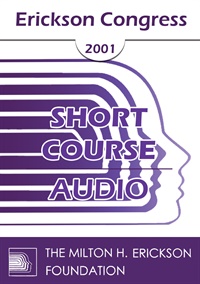
- Average Rating:
- Not yet rated
- Topic Areas:
- Short Courses | Hypnosis | Neurobiology | Pain and Healing
- Categories:
- Erickson Congress 2001 | Erickson Congress
- Faculty:
- Jeffrey Feldman, PhD
- Duration:
- 1:28:22
- Format:
- Audio Only
- Original Program Date:
- Dec 06, 2001
- Short Description:
- IC01 Short Course 04 - The Neurobiology of Pain Processing and Hypnosis - Jeffrey R. Feldman, PhD This short course will review the neurobiology of pain processing and hypnotic suggestion. Neuroimaging studies will be emphasized, including landmark studies by Rainville and his associates ( 1997, 1999) which identified distinct areas of the brain differentially activated depending on the nature of hypnotic suggestions. An hypnotic technique which utilizes the distinction between the sensory and affective dimensions of pain will be demonstrated. Implications for current practice and future research will be discussed.
- Price:
- $15.00 - Base Price

- Average Rating:
- Not yet rated
- Topic Areas:
- Workshops | Hypnosis | Neurobiology | Pain and Healing | Affect
- Categories:
- Erickson Congress | Erickson Congress 2004
- Faculty:
- Jeffrey Feldman, PhD
- Duration:
- 2:03:01
- Format:
- Audio Only
- Original Program Date:
- Dec 02, 2004
- Short Description:
- This workshop will review the neurobiology of pain processing, affect and hypnosis. Neuro- imaging studies will be reviewed elucidating individual differences in pain sensitivity and identifying distinct areas of the brain differentially activated depending upon the nature of hypnotic suggestions. A hypnotic approach that develops a dissociation between sensory and affective components of pain through the accessing of prior positive emotional experience will be demonstrated.
- Price:
- $15.00 - Base Price
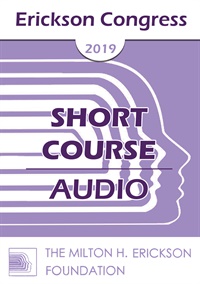
- Average Rating:
- Not yet rated
- Topic Areas:
- Short Courses | Anxiety | Communication | Depression | Neurobiology
- Categories:
- Erickson Congress | Erickson Congress 2019
- Faculty:
- Bart Walsh, MSW
- Duration:
- 1 Hour 29 Minutes
- Format:
- Audio Only
- Original Program Date:
- Dec 12, 2019
- Short Description:
- Chronic anxiety and depression present significant challenges for those affected by these conditions. A behavioral treatment which accesses deep levels of mind-body functioning facilitates remission of these debilitating conditions. This treatment, conceptualized as essential neurobiological communication (ENBC), incorporates a form of body language known as ideomotor signaling.
- Price:
- $15.00 - Base Price
Tags: Anxiety Depression Neurobiology







